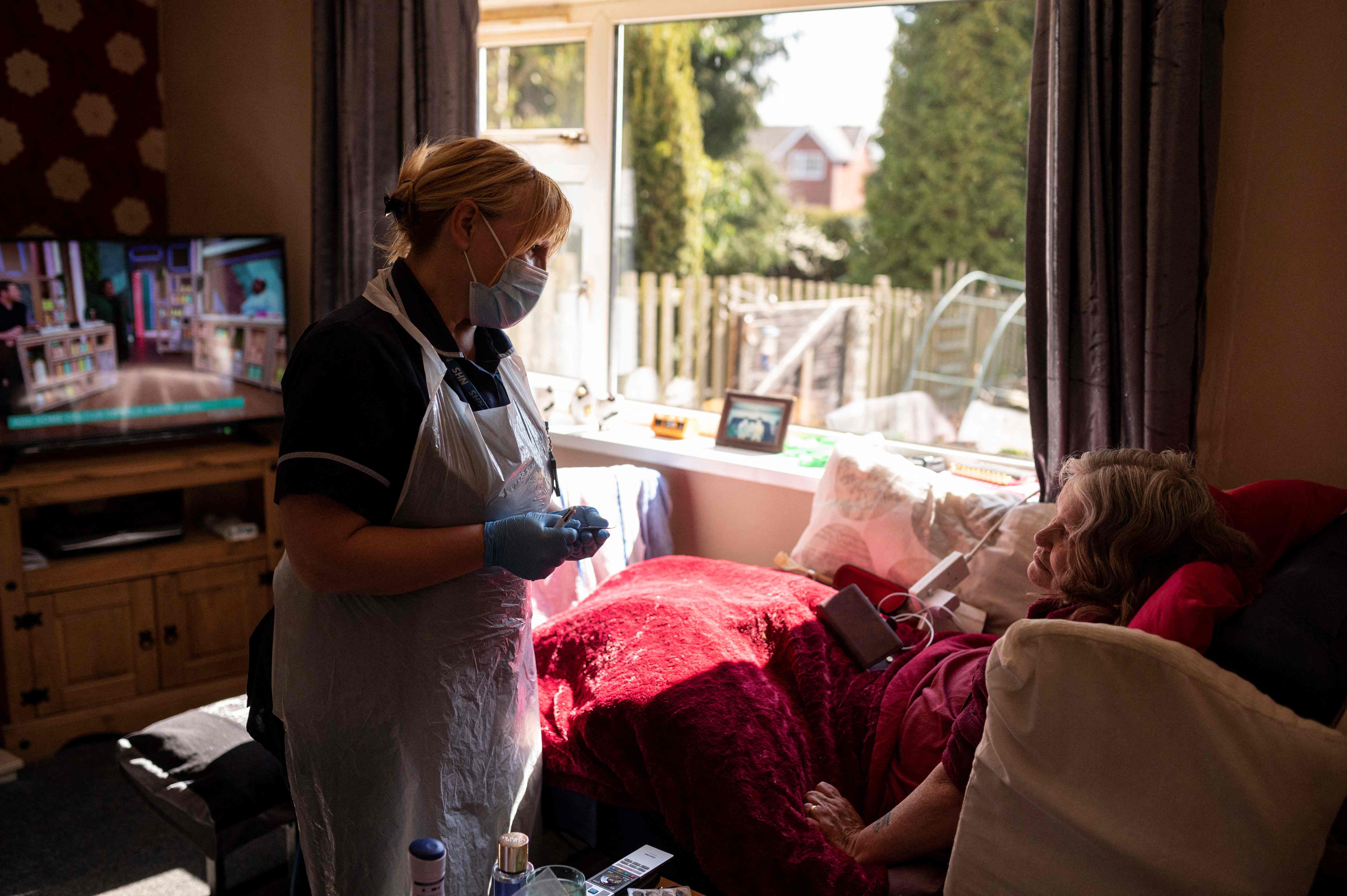Care homes refuse NHS discharges as mandatory vaccines drive staff exodus
One major care home provider has warned it will have to restrict hospital admissions due to a lack of staff

Your support helps us to tell the story
From reproductive rights to climate change to Big Tech, The Independent is on the ground when the story is developing. Whether it's investigating the financials of Elon Musk's pro-Trump PAC or producing our latest documentary, 'The A Word', which shines a light on the American women fighting for reproductive rights, we know how important it is to parse out the facts from the messaging.
At such a critical moment in US history, we need reporters on the ground. Your donation allows us to keep sending journalists to speak to both sides of the story.
The Independent is trusted by Americans across the entire political spectrum. And unlike many other quality news outlets, we choose not to lock Americans out of our reporting and analysis with paywalls. We believe quality journalism should be available to everyone, paid for by those who can afford it.
Your support makes all the difference.Care homes have had to refuse NHS requests to discharge patients into their care as the government’s mandatory vaccine deadline forces staff out, increasing pressure on services.
One of the largest care home providers in the country, Four Seasons Health Care, has had to refuse NHS requests to discharge patients into its homes after losing staff ahead of the mandatory vaccine deadline tomorrow.
The latest figures show nearly 32,000 care home staff have yet to have any jabs and another 30,000 have only received their first dose, meaning the sector could loose tens of thousands of staff from Thursday.
Speaking to The Independent, Jeremy Richardson, chief executive of Four Seasons, said that in the last two weeks the provider had refused 80 requests from the NHS for admission, as the loss of staff meant that homes would not be able to ensure safe care if they accepted the patients.
Mr Richardson warned that the government’s decision to mandate vaccines was “really unhelpful and unnecessary”. He said: “I don’t think the government should have mandated the vaccine. I don’t think it’s necessary; I think it’s a retrogressive step.
“During the winter what you tend to see is a greater level of discharges from hospital into care homes. It’s very clear the social care sector is not going to be able to support the NHS in the same way it normally does, because there just aren’t the volume of people to support the NHS’s requirements this year.
“We have got to, in some cases, restrict numbers of admissions we can take, to ensure we can continue to provide the level of care we need to.”
Yesterday the government confirmed that NHS staff would have to be fully vaccinated from 1 April next year. However, its analysis accepted that 73,000 NHS workers, and 35,000 care workers, may not have had their vaccines in time, and warned that this could lead to reduced or delayed services.
The NHS is facing one of its toughest winters yet in terms of A&E admissions and attendances. One of the key drivers of pressure within the service is the high number of patients in hospital beds needing to be discharged, as this means beds are not available for new admissions.
The chief executive of South Warwickshire Foundation Trust, Glen Burley, told The Independent that NHS leaders were “really concerned” about the situation care homes will be left in.
He said that despite there being good reasons for mandatory vaccines, the rule in the short term “presents another challenge in an already stressed system”.
He said the problem was not just with freeing up hospital beds but that “the last thing you want is for a patient to be marooned in an acute hospital, because that can lead to other complications and potentially, for some patients, never getting back to their care homes”.
Nadra Ahmed, executive chair of the National Care Association, called for the government to delay the care sector’s deadline to April next year in line with the deadline set for NHS staff.
She said: “We know the vaccine is a key component of our fight against the virus, but it needs to be recognised that the unintended consequence of it is that no staff means no care.
“The NHS will struggle to discharge out of the acute sector into safe environments where people can be supported at a critical time in their lives.”
Matthew Taylor, chief executive of the NHS Conferation, which represents NHS trusts, said: “The evidence is clear that a fully supported social care system is crucial to the effective running of the NHS. Without the right care in place, people who are medically fit to leave risk having to wait longer in hospital than they need to, at a time when capacity is crucial.”
Gyan Dass, registered manager and director of Two Rivers, a care home in north London that supports women with learning disabilities, told The Independent her home had lost five staff out of 40 due to the vaccine rule, and as a result had workforce gaps.
Ms Dass said it would become increasingly difficult to get patients with learning disabilities out of hospital. She also said staffing pressures would mean that homes would not be able to make fresh food any more, and would have to rely on frozen.
She said: “We have staff feeling that their human rights are being taken away. I spent the whole day recruiting, and of the CVs I got, many were not vaccinated. About 50 per cent of the people I’ve spoken today about jobs were not vaccinated.
“It’s getting harder every day. And we are really, really worried what’s going to happen. This is really bad timing; our staff morale is low and they are feeling exhausted, completely demotivated.”


Join our commenting forum
Join thought-provoking conversations, follow other Independent readers and see their replies
Comments